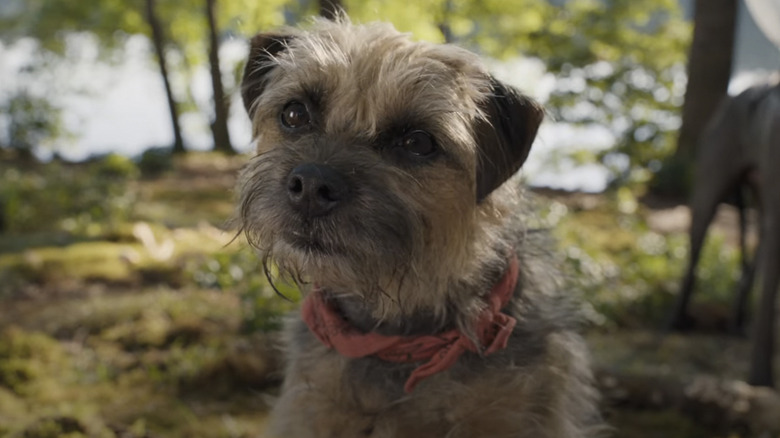
You've heard the old maxim a million times: In Hollywood, one should never work with children or animals. Director Josh Greenbaum ("Barb and Star Go To Vista Del Mar") broke that rule with his new movie, "Strays," an R-rated comedy from Universal Pictures which features tons of real animals and the voices of A-list actors like Will Ferrell and Jamie Foxx. But if the newly released trailer is any indication, his decision will ultimately lead to a ton of laughs for audiences as they follow the adventures of an open-hearted dog who goes on a revenge mission against his abusive owner.
Before the trailer debuted, I had the chance to speak with Greenbaum about the challenges of this production, working with the dogs as well as their trainers, collaborating with producers Phil Lord and Chris Miller, incorporating ad-libs into the final version, and much more.
Note: This interview has been lightly edited for clarity and brevity.
'Some Days Were Like Magic And Some Were Nightmares'
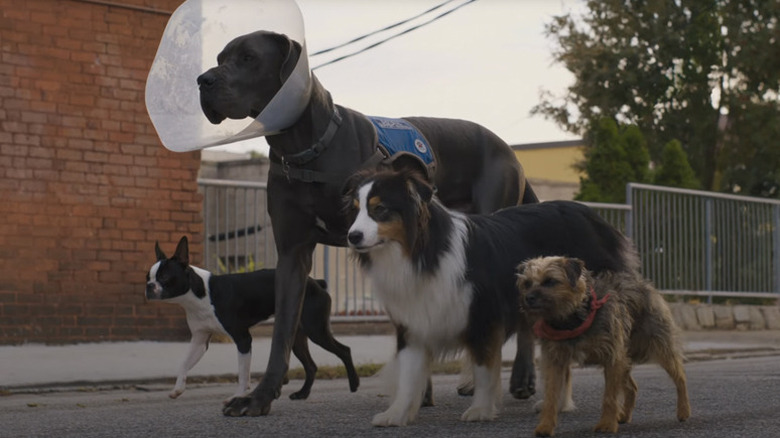
This movie looks very funny, but it also looks like it was an absolute nightmare to shoot. So how was it actually in practice to work with these animals?
Some days were like magic and some were nightmares. I think that you used the right word. I sort of knew going in and we had the best trainers and the best dogs in the world, but they're still dogs and sometimes they occasionally would run around set, smashing into every C-stand. They get the zoomies. So we had a couple of days like that. But no, I was actually pretty surprised by -- it was a lot of prep. I storyboard the whole film and built animatics largely so that I could show the trainers, who really were my actors, what we're shooting, what the blocking is, where the cameras is.
Because one of the things I didn't really know is you always have to think about also where you're putting the trainers, because that's what the dogs are looking at. So it's like a logistical puzzle. But it was actually kind of fun. Our set was this weird quiet [place] because we had to keep it very quiet for the animals. So it was months long of being very quiet. And then of course Will Forte showed up and I was like, "Will! A human!"
But I guess I created that mess myself because I early on set the whole rule that I wanted the film to be as much real dogs as possible and capture their organic behavior. As great as our CG has evolved over the last decade or so, most of us live with dogs and we know them very well. I think you can get away with an elephant or an alligator, things we may see once a year in the zoo and you're like, "That looks really good." But dogs, I just wanted to make sure that part was touching the ground so that our comedy could fly. So anyway, I definitely made the mess for myself, but we worked through it.
'It's Outrageous And Funny And Loud And Irreverent'
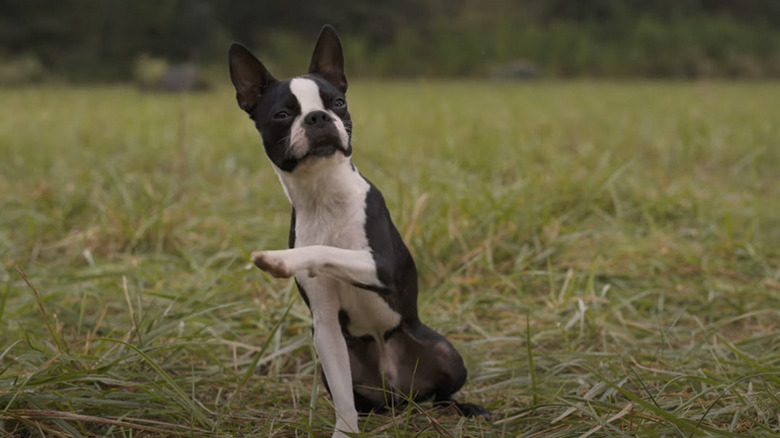
You mentioned the organic behavior of animals coming through. In the trailer there's that moment where one of the dogs mentions his paw and we can see that he's lifting his paw as he says it. Is that something where the dog did that on the day and then you rewrite the line to match the action of the dog?
We did both. [The trainers] had a list of 50 or 60 behaviors that we needed, like the spinning around to go to bed, which is not in the trailer, but you'll see. We do a funny run on that. They had a list of behaviors. So that example that you saw was trained, but a lot of the times things would happen on set that were really funny, and then I'd show Jamie Foxx and Will Ferrell and we'd write jokes for it.
So one example is that same dog, Jamie Foxx's dog, is walking through the woods and he's pissed off about something. He's kind of grumbling to himself. And while we were shooting this, this tiny little leaf fell down next to him, floated down, and the dog [flinched]. So Jamie, of course, watched that and we wrote, "F*** you, leaf!" and it became this whole thing. So it was kind of a combination of both, which was really fun. We were constantly writing and rewriting the film in the edit room, which is very creative and just keeps making it better and improving and refining it.
What kind of things were you looking at for inspiration here? When I watched the trailer the first thing I thought of was "Homeward Bound," but R-rated. Were you looking at those old '70s, '80s, '90s movies?
A little bit. That was part of the impetus behind the project for sure, and I wanted to see what they did and how we could make sure we were conjuring up that. But ultimately, the film is not a spoof movie, which is why I loved it when I first read it. It really operates on its own. We send up that genre that I love, like "Homeward Bound," "Milo and Otis," "Beethoven," all those kind of fun films. There are moments where we send that up, but the film really functions on its own. My references actually were more in the world of "Stand By Me" and "Breaking Away" and "Bridesmaids" -- coming of age stories through friendship. When I met with my team and my DP, that was kind of how we talked so that we were really distancing ourselves and really creating a film that, as you'll see when you get to watch it down the line, it actually has a lot more heart and an emotional center.
It's outrageous and funny and loud and irreverent and all the things you can hopefully glean from the trailer. But I'm very excited to say that it also has this very surprising emotional center, which is really important for me as a filmmaker. I know for Phil Lord and Miller, Chris Miller, the producers, we're all in that same camp of the best comedies sort of surprise you with how emotionally invested you are and how these characters feel really three-dimensional and real. And even though they're dogs, I think when you watch the film, you forget in a great way that they are, and you'll kind of weirdly identify, "Am I a Reggie or a Bug or a Maggie?" You'll identify with the characters, not simply in terms of dog terms.
I was going to ask about Lord and Miller. What do those guys bring to a project like this as producers for you?
They're just great. I mean, as a fan of all their work, it's just a great creative collaboration. They bring lots of different things. They'll chime in at script level, we'll watch cuts together, we'll have ideas, they'll write pages. I mean, they'll get their hands in and be like, "Here's a joke." We would constantly be writing alt jokes when you bring in Will and Jamie, so I felt very fortunate and had a great relationship with them. Like I was just saying, I think what they do is they constantly -- it's similar to me -- you're constantly asking, "How do we subvert the genre or zig when our audience thinks we going to zag? How do we do something new?" But also I think a question at the forefront of their minds, like mine, is how do we also make sure it's emotionally honest and grounded in a way that you can connect with and doesn't just feel like jokes.
I was wondering about that too, because from the trailer, it looks like this movie goes to some pretty wild places, and I was curious if there were any moments where you felt things went too far and you decided to pull things back or shift things around in order to make sure that the audience would still be with you on that journey.
I think you're always doing that in any film, and particularly comedy. You're always trying to figure out where the line is. Once you've gotten into the R-rated kind of outrageous comedy, I think you want to push that line because you want to surprise an audience. So I don't know if there's any specific one, this or that, but you're always kind of dialing up and down the knobs to say, "Oh, let's push this, let's pull that."
The primary thing is I knew I wanted to deliver for a movie that has a plot focused on revenge and literally biting Will Forte's dick off [laughs], I knew that, "Okay, we're pointing and building towards a climax that excites me." Because as a filmmaker or as an audience, I'm like, "What are they going to deliver in this moment?" And I'm very happy to say, that was a huge focus of mine from the very first moment I was on. I was like, "I want to make sure we dial that, we build toward it and we deliver it in a way that's unexpected and fun and big and crazy." So that was one that we spent a lot of time on and I'm excited when you get to watch it and you'll let me know what you think. But certainly from the reaction from our early previews, it was really exciting. There was a lot of applause and it was like, "Oh, we got something. It's working."
'I Wanted The Film To Be Cinematic And Be A Theatrical Experience'
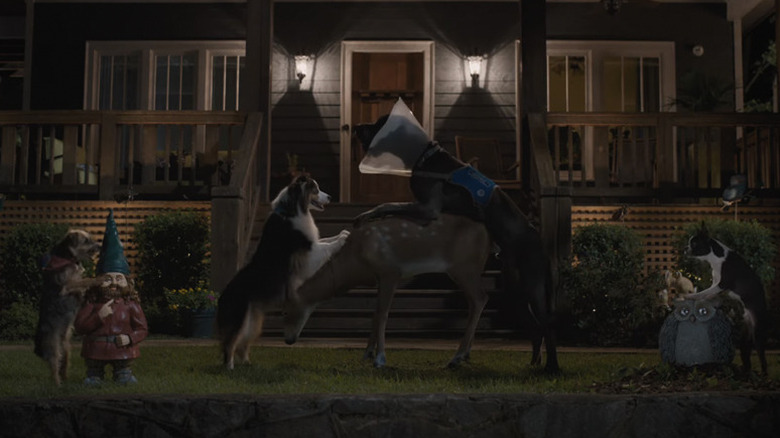
So you opted to use CG for the mouths for the dogs. I assume that helps out a lot with ad-libbing and that seems like something that you could tweak up until the last second. But did it give you anything else aside from that, or was that the primary reason for going that way with it?
No, you're dead on. That's the primary reason. And obviously the other time we lean on CG is when what we wanted from the dogs was either unachievable -- you can't train it -- or unsafe. I mean, the highest level of my concern from the get-go when you're doing a film like this is making it safe for the animals, our crew, for everyone.
But like I mentioned earlier, the idea that we could keep rewriting was great. Our VFX team was like, "Guys, we've got to stop rewriting these lines pretty soon." [laughs] But I think all of us, Phil and Chris, myself, the writer, Will and Jamie, we're constantly getting new ideas. You get new footage, you try new jokes, and that was great. That was a very creative process.
You were talking about storyboarding the whole movie and then realizing that the trainers had to be placed in a specific spot on set. Did that mess up your storyboards in a way? How did that work?
What was good was I actually did have a meeting with the trainers during all of that, so that was always in the back of my mind. The first thing I would do when I would board up a scene, and then sometimes we'd build animatics, was I would actually get it right in front of the trainers right away and let them flag things for me. Yeah, we'd occasionally have to rethink things on set. Of course, you're working with the animals, so sometimes you have to rethink things on the fly. Lots of tricks, like many of which I didn't know prior. I could go now make another dog movie and really be an expert. But we'll see. I'll keep doing lots of different films. But no, they were amazing.
Worst case scenario, none of them want to do it, but [the trainers will] throw the full blue suit on and then they're just right in the scene. And in our raw dailies, you see these people moving in full blue suits with their little treat or their instruction to the dog, and then we would paint it out later. But it's a million different techniques of what we're using for any given shot. We're splitting a lot. You like the performers of this dog, but that dog was kind of totally out to lunch that day. So you're merging [multiple takes into one shot].
A big thing I wanted to do is I wanted the film to be cinematic and be a theatrical experience. I'm so excited that this is out in theaters. I really believe comedies deserve and need to be. It's a communal experience. Our culture needs that, I think, to all laugh together at something. So I wanted to make sure it was cinematic and theatrical. To me, that means having interesting dynamic shots: Wide shots, moving shots, not just a bunch of singles. So that made the job a little harder, but we figured it out.
'For This Film To Work, You Have To Hate Him Enough'
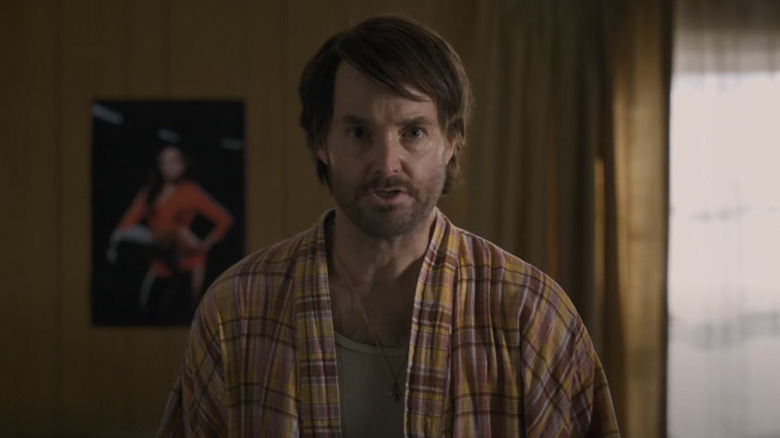
I've got to sneak one "Barb and Star" question in here while I have you, because I'm a big fan of that movie. Can you tell me about the decision to have Kristen Wiig play two roles? Because I read somewhere that another actor originally auditioned to play the villain, so what went into the decision to have Kristen play that part?
Oh, you did sneak an interesting "Barb and Star" question in here. It's a lot of different things. I think the simple answer is I, from the get-go, wanted her to play both parts and she understandably wasn't sure in the sense of, "Is it too much to take on as producer, writer, actor? Does it feel like narcissistic in any way? Look at me." But I just was like, no. I'm sitting in a room with her for a year developing that script. They wrote it first, then we reworked it, she and Annie [Mumolo] and I. And hearing her read that part, in my mind, I'm like, "No one else should be anywhere near this role." So the reason you may have heard that a couple of people maybe sort of read was that we were still in that process of feeling out.
It was a conversation between Kristen and I, and I'm really grateful that my theory won out and she trusted me because I think she was nervous to do it. And of course I knew she would crush it. And she's amazing in it. Her dynamic with Jamie Dornan was so funny. And then when they got in the room together, once Jamie came down to Mexico City, when we started filming, we did rehearsals like, "Yes, they're so funny together." So I was really grateful that that's how it worked out.
I have time for one more question. On "Strays," was there a moment that people might not expect that was really difficult to pull off that had nothing to do with the dogs?
The reality is I think that the bulk of the work with Will Forte, who is playing a villain that, in my mind, for this film to work, you have to hate him enough, and Will knew that right away. My early conversations with Will, he was like, "How bad am I playing this guy? Am I funny?" And we talked through it, but we always knew the baseline was we wanted -- the reason I cast Will is because I wanted you to enjoy watching him be a terrible dog owner and be able to kind of laugh through it, which I think you can, and he's the best at that. But we always knew we had to find the right level of menace as a villain where you really do want him to get his comeuppance and you really want Reggie, Will Ferrell's character, to succeed in finding his own inner self-worth. Because he's been dumped. And that's really what the film is about. It's about relationships. It's a metaphor for toxic relationships.
So to answer your question, I think that was surprisingly more difficult to dial. And what was so great with Forte is we would do levels on set. I would be like, "Let's go a little darker. Let's lighten it up a little." And that way we have options to edit because that stuff's tricky. And I get it, too. When you're dealing with anyone being unkind to an animal it's like, you don't need a lot. A little bit goes a long way. Then of course he throws his comedic, ridiculous spin on this total loser character, and you feel you know the guy and you also are like, "Oh, this guy's terrible," which Will Forte does. He does so many things wonderfully, but he does that better than I think anybody else out there.
"Strays" hits theaters on June 9, 2023.
Read this next: The Funniest Movie Scenes Of 2022
The post Strays Director On His Stars Getting the Zoomies, His Cinematic Inspirations, and More [Exclusive Interview] appeared first on /Film.
0 Commentaires